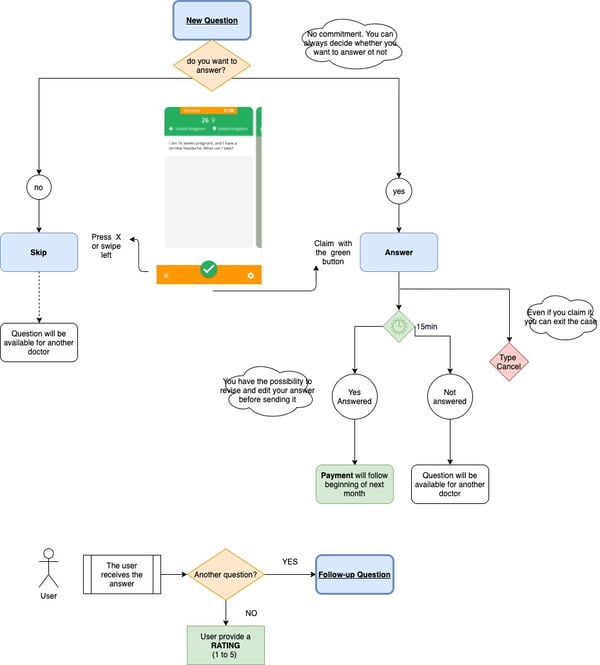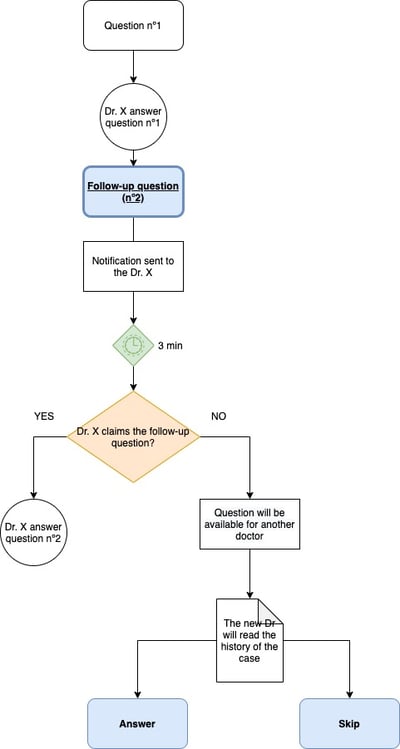Clinical Guidelines
These indications are for the use of the Abi ProApp for software medical contributors. They provide guidelines to answer text-based questions from Abi’s customers.
To create these guidelines, we have used information from scientific articles, as well as our experience in thousands of cases handled by Abi’s physicians and monitored by Abi’s medical team.
What is Abi?
Abi Global Health, is a company registered in Ireland that provides a health information service that is available to users all over the world. Our objective is to be their first source of health information, using mobile technology in the most convenient way.
Abi is the name of the chat interface that receives questions from the users, sends them to the doctors and back to the users. Technically, Abi is an artificially intelligent agent, or Chatbot, that uses natural language processing technology to turn normal human language into computer commands to operate the service.
Answering questions
a. Description of the process

b. In case of follow-up questions
The users have the possibility to ask a new question after the first answer. The first doctor to be notified is the same one who provided the previous answer. If after 3 minutes the follow-up question has not been claimed yet, other doctors will be notified.
In case of follow up questions, it will always be possible to see the entire case from the first question, including the answers provided by other physicians.

Content and style of the answer
a. Information, not diagnosis or treatment
Your answers are expected to be informative, and to help the users with the concerns they have about their health. You are not supposed to provide diagnosis or treatment in any case. If you have to express an opinion, always explain that the opinion is given according to the information available.
Since the User remains anonymous, no User-doctor relationship is established. It is clearly explained to the User in our Terms and Conditions that Abi’s service is for general information purposes.
b. Medical common sense
We expect you to use your medical common sense to provide information that is in accordance with the information provided by a User. Abi is not intended for Diagnosis, Treatment or Prescription. It is intended to be a useful tool for users who have health concerns and need reliable information to help them to make decisions.
If you are not able to provide a pertinent answer, or you just don’t have the time, you can Skip the question or Cancel at any point during the process.
c. Digital bedside manner
We prefer doctors to use a sober and gentle style for the answers. After thousands of cases, we know our users, like most people, don’t like short and sharp answers, even if the User may sometimes provide information using a truncated ‘SMS-style’ of writing.
As an example, our most successful doctors begin with sentences like “I’m sorry to hear you’re not well” or “Thanks for your question”. They finish with sentences like “I hope this reassures you” or “I hope you feel better,” which our users greatly appreciate.
General strategies to answer text-based medical inquiries
Some basic rules will help you answer questions in a safe and helpful way.
- Keep close to the facts given in the inquiry.
- Answer in the clearest and simplest way possible (this doesn’t mean a short answer, it is important to clarify the answer with an explanation).
- Explain medical terms in plain language. Personalize the answer to match the language used by the inquirer and to the perceived knowledge level of the inquirer.
- Always be respectful to the inquirer but also to previous caregivers; be supportive of a pre-existing relationship.
- Avoid trying to diagnose; instead educate, guide and empower. Often the user only needs to know what the next step they should take is.
If you need more information or clarify the inquiry, ask short and concrete questions to the inquirer.
Examples of frequent inquiries
| Inquiries | Strategies |
|---|---|
| Inquirer worried about a serious condition. | Meet the worry and anxiety with knowledge and information. Provide information to the inquirer on how to take further action. |
| You (the Dr.) are worried that the inquiry might be a serious condition. |
Make it clear that the condition needs further evaluation by an ordinary caregiver. Give concrete, straightforward advice. |
|
Inquirer does not fully trust a previous caregiver |
Try to sort out possible misunderstandings. Support the inquirer with information and suitable questions to bring to the ordinary caregiver. If the distrust seems to be relevant, encourage the inquirer to see another caregiver. |
| Short inquiry with undefined or unclear medical problem. | Make it clear that the problem cannot be fully interpreted, as the information provided is insufficient. Ask concrete and clear questions to clarify the inquiry. |
| Long and/or confusing inquiries with undefined or unclear medical problems. | Try to unravel, sort out, the information of the inquiry by structuring the facts given, thus trying to identify the underlying concern. Try to identify the question and restrict the answer to it. |
| Answering the “expert inquirer”, who has carried out extensive medical research before submitting the inquiry. | If possible, try to help the inquirer to evaluate his/her required information; what should be trusted and what should not. Show respect for the medical research the inquirer has done. |
| Answering inquiries are written by another person than the one the inquiry concerns. | Formulate an answer as neutral and medically correct as possible. |
| Answering inquiries about chronic diseases that have already consulted multiple professionals and have received several lines of treatment, but the symptoms do not improve. | Tell the User that it is a complex problem that can only be solved by a specialist. Make it clear that Abi has limitations, especially in such complex cases, which need the reviewing of extensive clinical information and other investigations. |
| The inquirer describes a situation where there is a clear suspicion of harm or abuse being inflicted to him/herself or other persons. | Report the user to the police (provide local telephone number if you know it) Contact Abi’s medical service to report the situation by email or by phone directly. |
| The inquirer asks for matters non-related to health | These questions should be blocked automatically by Abi. In case you receive one, please indicate to the user to address the matter to Abi help desk at info@abi.ai and thank the inquirer for his/her understanding. |
| Suicidal thought / Suicidal ideation (passive): ideas, or ruminations about the possibility of ending one’s life. ex: “At night, I often think I’d rather be dead” |
This is a symptom of concern and should be addressed by Abi doctor without our intervention. Usually, an in-person visit with the GP or Psychiatrist should be advised. |
| Active suicidal ideation: the person keeps thinking about dying and even plans how to commit suicide. eg: “I have been thinking about how it would be to jump from a window.“ |
Abi doctor should inquire about real intentions of committing suicide. The doctor should recommend a visit to the nearest ER or going directly to the GP without scheduling a visit. If there is an immediate threat, then act as stated in the next step. |
| Suicide threat: Thoughts of killing oneself that are verbalized to others. eg: “I bought some medication and will take all the pills together tonight” |
Abi doctor should recommend calling 911/112 or an ambulance, and should seek from user’s confirmation on that. Abi team will contact the user to stress the doctor’s answer. If the threat is immediate and there are available contact details, police should also be contacted |
About our users
A. How do they find out about Abi?
Some users personally buy the service through our website (www.abi.ai) or through the website of an authorised distributor or partner.
Some users are offered Abi for free by their health insurance provider, employer, public service or other Payer.
B. How do users access Abi?
Abi is not an App which users download. Rather, Abi is a Chatbot that exists on a user’s mobile phone as a local telephone number or social media contact. Therefore, users can access the service through the messaging functionality of Apps like WhatsApp, Telegram, Facebook Messenger, Skype, Line, Kik, iPhone & Android Messages and SMS. Some users also access Abi from within 3rd party health apps which have embedded the Abi Chatbot into their Apps.
Before using the service, the user accepts our Terms and Conditions which clearly specify the scope of the service.


